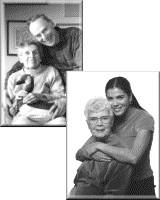 |
Financial and Legal Articles: Medi-Cal
Planning for the Elderly

By Thomas R. Higelin, Elder Law
Attorney
As we age, many of us contemplate the
prospect of nursing home care, and how to pay for it. Essentially,
there are only three ways to pay for nursing home care: private pay,
long term care insurance, or Medi-Cal. Some can afford the $50,000
to $60,000 a year for private pay, and those who have invested
carefully in a Long Term Nursing Home Insurance Policy may only be
required to pay a small part of their nursing home costs or none at
all. But many others will turn to Medi-Cal for
assistance.
Medi-Cal is the Federal entitlement
program, managed by the State, which provides financial assistance
for general medical needs, in-home care services and nursing home
costs. Most everyone understands that eligibility for Medi-Cal is
based on the amount of assets you have. When determining
eligibility, the State distinguishes between income and assets.
Income includes such things as earnings, dividends, interest, social
security, pensions, Veterans benefits, etc. Assets include
everything else. The State further differentiates between those
assets (resources) which are “exempt” or not countable, and those
which are “non-exempt”, or countable. The following is a list of the
exempt resources which represents all that an applicant can own and
still be eligible for benefits:
- One home (the principal
residence)
- One car
- All personal and household
items
- Term Life Insurance
- Other Life Insurance policies with a
total face value of $1500.
- Burial Plots and Pre-paid
Irrevocable Burial Contracts
- A Burial Plan of $1500
- IRA’s, pension funds such as 401K’s
and Keoghs (these will be counted as income only, if the applicant
is receiving periodic payments of principal and interest)
- $84,120 of resources (for married
couples)
- $2,000 of resources (for the
applicant)
When reviewing your finances in terms
of Medi-Cal eligibility, the first step is to evaluate how close you
are to being eligible by determining which of your resources will be
counted and which will not be counted. The next step is to place a
value on the total non-exempt (countable) resources — be it
investment accounts, real estate, promissory notes, income property,
limited partnerships, extra vehicles, and so on. If the total value
of your countable resource is less than $84,120, eligibility is
achieved for a married couple ($2,000 for a single person). For
non-exempt assets over $84,120 a plan can be developed based on one
(or a combination) of the following options in order to achieve
eligibility.
Medi-Cal Planning Options:
1. Converting a non-exempt asset to an
exempt asset: Since the goal is to reduce assets to $84,120 (or
$2,000 for a single person) a process known as “spend down” is often
a first consideration. Excess cash resources may be spent in any
manner, so long as fair market value is paid.
2. Converting a non-exempt asset to an
unavailable asset: Resources will not be counted if they are
considered “unavailable” to the applicant. Availability is defined
as existing if the applicant “has the legal right, power and
authority to liquidate it.” Also, if a “bona fide effort” has been
made to liquidate an asset and the asset is in process of
liquidation, it too is considered “unavailable” in the
interim.
3. Gifting: Even though a cash gift can
result in the imposition of a penalty period, the manner of gifting
can also avoid penalty. Medi-Cal determines which gifts are
allowable based on how much you gave away and when you gave it away.
The amount of a cash gift that can be made without penalty is based
on the Average Private Pay Rate of California nursing homes, which
in the year 2000, is set at $3836. Gifting can be accomplished
successfully within this framework.
4. Fair Housing and 3101 Petitions:
Adjustments through the court or the Fair Hearing process are
available in order to increase the Resource Limit of $84,120. The
justification for the increase is that the assets must be preserved
to maintain income generating savings.
This article is
reprinted with permission by the author. If you have feedback or
would like additional information on legal or financial aspects,
contact Mr. Higelin at (916) 784-7400.
|

 |
 |